News & Announcements
- Details
- Written by Joshua Wachtel
 In "Restoring Relationships: What churches can learn from restorative justice," Paul Pastor for Christianity Today writes:
In "Restoring Relationships: What churches can learn from restorative justice," Paul Pastor for Christianity Today writes:
Bruce Schenk is a Lutheran pastor and the director of Canada's International Institute for Restorative Practices. The IIRP is an internationally affiliated organization dedicated to education and research in restorative justice — an approach to community conflict that emphasizes relationships. Bruce has worked in the area for the past 15 years, using his skills in contexts ranging from incarcerated juvenile offenders to church congregational decisions. Now, he's bringing what he's learned to a wider audience. His trainings have been sponsored by the Evangelical Lutheran Church of Canada to better equip clergy and laity to foster healthy relationships and manage conflict.
I asked Tom Albright of Ripple Church in Allentown, Pennsylvania how Schenk's philosophy has impacted his congregation. "Shalom and reconciliation are the heart of the gospel," Albright said. "Restorative practices give us the tools to enact peace, redemption, reconciliation, and healthy relationships." Ripple's pastoral staff are all trained in restorative practices—a story for another day, but one worth telling.
Schenk and I sat down for a phone conversation on restorative justice in church settings. He thinks Christian leaders need to rethink decision-making—and conflict—in their congregations, and why "thinking restoratively" is at the heart of the gospel.
Read Restoring Relationships: What churches can learn from restorative justice.
- Details
- Written by Joshua Wachtel
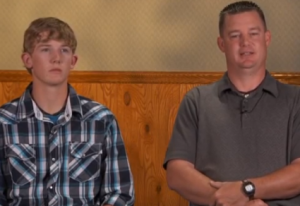 Cody Gates and his father, Gordy Gates, discuss the impact of a restorative conference after Cody set off fireworks into a crowd, from a video presentation sponsored by Easter Seals / Goodwill of the Northwest (watch below).There’s a restorative revolution taking place across the U.S. state of Idaho, originating in the field of juvenile justice and radiating out to schools and communities. It began a few years ago and is being driven by a mostly rural eight-county district in south central Idaho.
Cody Gates and his father, Gordy Gates, discuss the impact of a restorative conference after Cody set off fireworks into a crowd, from a video presentation sponsored by Easter Seals / Goodwill of the Northwest (watch below).There’s a restorative revolution taking place across the U.S. state of Idaho, originating in the field of juvenile justice and radiating out to schools and communities. It began a few years ago and is being driven by a mostly rural eight-county district in south central Idaho.
Judge Mark Ingram, a magistrate court judge for the Fifth Judicial District in Idaho, was exposed to restorative practices while practicing law 12 years ago. He worked with various kinds of mediation, beginning with personal injury but leaning more toward child custody and victim-offender mediation because they were “more relational,” he said. When he became a judge in his hometown of Shoshone, the Lincoln County seat, with a population of about 1,500, he began to look for ways to help resolve tensions in the community between old-time farmers and new transplants. A Community Justice Coalition with a restorative mission organized large community meetings to foster helpful discussions. But Ingram continued to struggle with the question of how to bring a restorative spirit into the court system in a practical way.
- Details
- Written by Joshua Wachtel
Restorative practices is about helping people have the "right conversation" so they can work through conflict and build relationships, says restorative practices pioneer Terry O'Connell, director of Real Justice Australia (iirp.edu/au).
In the first part of this short video, he talks about his work with young students who learn in school how to frame that conversation, even when they go home and have problems with their friends.
- Details
- Written by Joshua Wachtel
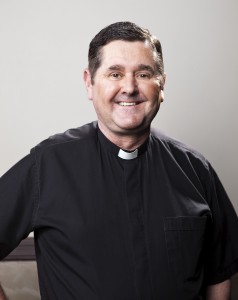 Father Chris Riley, Founder and CEO of Youth Off the Streets: "Restorative practices are focused on healing the community rather than retribution and blame and our troubled kids need this to be the focus."Youth Off the Streets (YOTS), a large youth-serving agency located in and around Sydney, Australia, has been on a journey of utilizing restorative justice to respond to misbehavior and has recently expanded that to implementing restorative practices to build community and relationships. The organization runs a variety of community, educational, residential and rehabilitation programs for at-risk and adjudicated youth.
Father Chris Riley, Founder and CEO of Youth Off the Streets: "Restorative practices are focused on healing the community rather than retribution and blame and our troubled kids need this to be the focus."Youth Off the Streets (YOTS), a large youth-serving agency located in and around Sydney, Australia, has been on a journey of utilizing restorative justice to respond to misbehavior and has recently expanded that to implementing restorative practices to build community and relationships. The organization runs a variety of community, educational, residential and rehabilitation programs for at-risk and adjudicated youth.
YOTS Founder and CEO Father Chris Riley said, “Several years ago, a young teacher approached me about looking for strategies to deal with troubled students, and I recommended she look at restorative justice. She embraced this literature, and all of our schools now operate using the RJ material.”
- Details
- Written by Joshua Wachtel
Faith Communities
“Restoring Relationships: What churches can learn from restorative justice” – Christianity Today's Paul Pastor presents a lengthy interview with Bruce Schenk, director of IIRP Canada.
IIRP news
 Dóra Szegő, IIRP Europe's new Assistant Director for Central and Eastern Europe• IIRP Europe welcomes Dóra Szegő as Assistant Director for Central and Eastern Europe.
Dóra Szegő, IIRP Europe's new Assistant Director for Central and Eastern Europe• IIRP Europe welcomes Dóra Szegő as Assistant Director for Central and Eastern Europe.
• Call for Presenters: Offer a session at IIRP's 17th World Conference.
• Martin Wright reviews Margaret Murray's Forging Justice: A Restorative Justice Mystery.
- Details
- Written by Joshua Wachtel
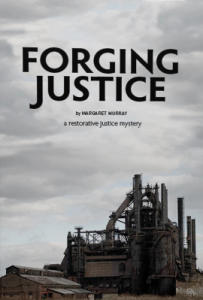 Forging justice: A restorative justice mystery. Margaret Murray. Pipersville, PA: Piper's Press, 2013. 231 pp.
Forging justice: A restorative justice mystery. Margaret Murray. Pipersville, PA: Piper's Press, 2013. 231 pp.
ISBN-13: 978-1-934355-26-8
Police detective Claire Cassidy was disillusioned after twelve years pursuing young people - often the same ones repeatedly - in the decaying steel town of Bethlehem, Pennsylvania. The story mainly follows the case of one teenage girl gang who rob a convenience store. Using her usual police methods, things don't go well, until she meets the vice-principal of the girl's school. He is trying to introduce restorative practices there, although his principal believes in zero tolerance. The policewoman is also sceptical, but the v-p perseveres (he has a remarkable amount of time to devote to this single case!) and a restorative meeting is held. He does a bit of explaining, and doubts the effectiveness of punishment (p. 54, 56), although the offender's mother accepts it (p. 205); but the tone is not didactic, and the dialogue, including the meeting itself, sounds realistic to an English reader. The victim is still angry, and there is no instant reconciliation. Given the sub-title, we know that it will work out, but there are some credible doubts and setbacks along the way, and some unanswered questions at the end. The story held my attention in a way that a case history would not have done; I recommend it as a good read, with a realistic introduction to restorative practice as a bonus.
Martin Wright is a restorative justice author and practitioner. He is a recipient of the European Forum for Restorative Justice (EFRJ) Award for his contributions to restorative justice over many years.
Margaret Murray's Forging Restorative Justice can be purchased in the IIRP Bookstore. For the UK and Europe, use IIRP Europe's Bookstore.
- Details
- Written by Laura Mirsky
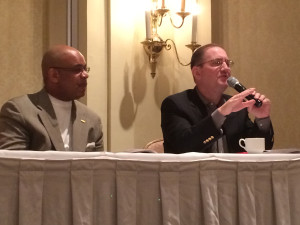 Dr. Joe Roy (r), superintendent of Bethlehem Area School District, discusses the impact of restorative practices at Freedom and Liberty High Schools, while Shannon Mayfield, former principal of William Allen High School in Allentown, Pennsylvania, listens.“After two years of restorative practices, there are no more ‘habitual offenders’ at Liberty and Freedom high schools. And there has been a 50 percent drop in expulsions,” Dr. Joseph Roy, superintendent of the Bethlehem Area School District, told guests at Celebrating Restorative Works, a Restorative Practices Foundation fundraising breakfast in Bethlehem, Pennsylvania, USA, on Sunday, March 30, 2014.
Dr. Joe Roy (r), superintendent of Bethlehem Area School District, discusses the impact of restorative practices at Freedom and Liberty High Schools, while Shannon Mayfield, former principal of William Allen High School in Allentown, Pennsylvania, listens.“After two years of restorative practices, there are no more ‘habitual offenders’ at Liberty and Freedom high schools. And there has been a 50 percent drop in expulsions,” Dr. Joseph Roy, superintendent of the Bethlehem Area School District, told guests at Celebrating Restorative Works, a Restorative Practices Foundation fundraising breakfast in Bethlehem, Pennsylvania, USA, on Sunday, March 30, 2014.
Dr. Roy explained, “With restorative practices, students are staying in school and learning.” Instead of exclusion for misbehavior, the focus is on building relationships and holding students accountable. Liberty and Freedom are the first schools to participate in Bethlehem’s planned district-wide restorative practices initiative, with the IIRP Graduate School’s SaferSanerSchools Whole-School Change Program.
- Details
- Written by Joshua Wachtel
Schools
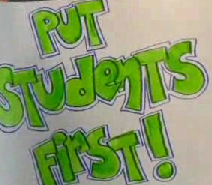 The Discipline Disparities Research to Practice Collaborative, a panel of 26 national experts, present to Congress evidence and recommendations that support restorative practices.
The Discipline Disparities Research to Practice Collaborative, a panel of 26 national experts, present to Congress evidence and recommendations that support restorative practices.
The American Federation of Teachers, an affiliate of the AFL-CIO with 1.5 million members across the US, recently held a summit on Restorative Practices in Schools in Washington, D.C. A leader for the organization argues at Education Week that "Suspensions Should Be Last Resort."
- Details
- Written by Joshua Wachtel
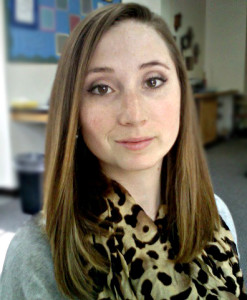 Liz Burian, who teaches Life Skills and Digital and Fine Arts at CSF Buxmont’s Bethlehem, PA, school, uses circles with students to present and review academic course content, and to maintain positive levels of behavior to ensure a great learning environment.
Liz Burian, who teaches Life Skills and Digital and Fine Arts at CSF Buxmont’s Bethlehem, PA, school, uses circles with students to present and review academic course content, and to maintain positive levels of behavior to ensure a great learning environment.
At the beginning of each class, says Liz, every student identifies an area of behavior that could be a problem — like talking or getting distracted — and says what they’re going to work on that during the class. Liz then relies on the students themselves to help maintain a safe, quiet learning space.
“If you send a student out of class, you get rid of the problem but you actually take your own power away.” Liz says, “As a teacher you have to realize you have a great community in your classroom to support positive behavior, instead of relying on punitive measures.”
- Details
- Written by Joshua Wachtel
In the following video, filmed at the IIRP's 16th World Conference in October 2013 during a plenary panel on Restorative Practices in the Faith Community, IIRP master's candidate Tom Albright discusses Ripple, the ministry he has helped create based on restorative practices and principles.
View a video of Tom Albright wearing another hat, a teacher working in a school-to-work transition program at Bethlehem, Pennsylvania's, Freedom High School.

Restorative Works Year in Review 2024 (PDF)
All our donors are acknowledged annually in Restorative Works.
